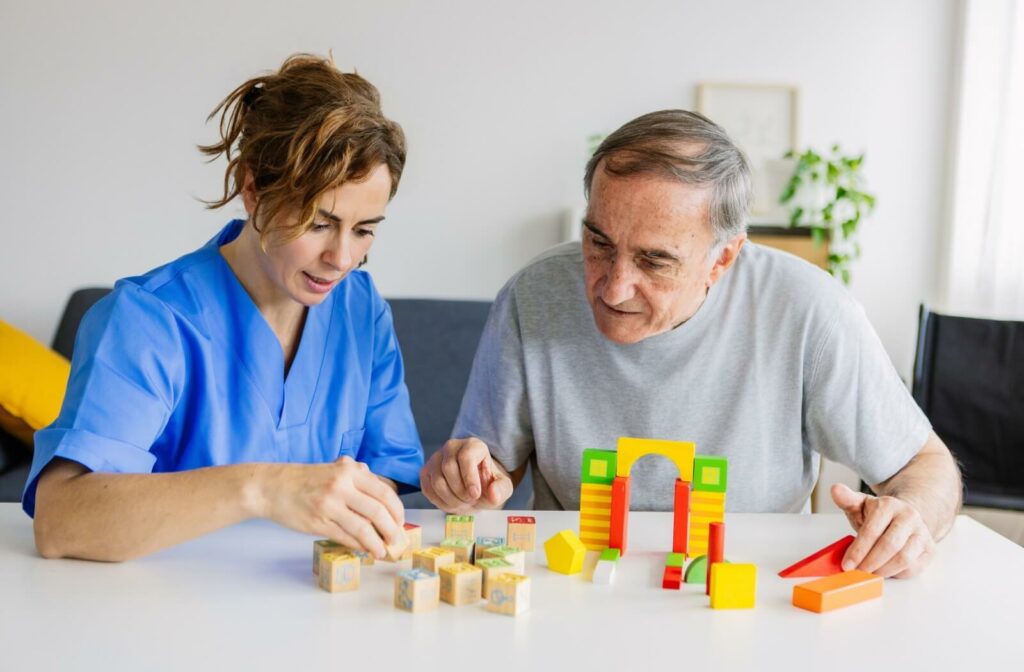We’ve all been there, misplacing your phone, struggling to recall the name of that actor from your favorite show, or walking into a room only to forget why you went there in the first place. These occasional memory lapses are a normal part of life, and as we get older, experiencing forgetfulness can feel even more frequent.
A key difference is that forgetfulness is occasional and doesn’t interfere with daily life, while dementia involves persistent, progressive memory loss that disrupts a person’s ability to function independently. Understanding this distinction can help you feel more at ease or guide you toward seeking professional support for a loved one.
It’s important to recognize the signs that may point to something more serious and learn practical ways to support memory health as we age.
What is Considered Normal Forgetfulness?
Forgetfulness is not unusual, even as we age. Life is busy, and our minds juggle countless tasks and details every day, so it’s no wonder our memory might fail us occasionally. These minor lapses typically don’t significantly disrupt daily life or independence.
Signs of Normal Forgetfulness
Here are some examples of memory loss that may be classified as normal forgetfulness:
- Misplacing everyday objects like your reading glasses or keys.
- Occasional forgetfulness of names or appointments but remembering them later.
- Mild multitasking difficulties, especially when faced with complex tasks.
- Forgetting specific words during conversations but recalling them shortly after.
- Making the odd poor decision without it causing major consequences.
These instances are usually harmless annoyances rather than cause for alarm. They’re also often temporary, exacerbated by factors such as stress, fatigue, or lack of sleep. Fortunately, there are steps older adults can take to improve memory retention.
How to Support Memory Retention
While normal forgetfulness isn’t something to fear, staying proactive can sharpen mental clarity and reduce frustration. Here are practical memory-boosting tips:
- Stay organized by using calendars, reminder apps, or sticky notes to keep your schedule on track.
- Exercise regularly to help improve blood flow to the brain, supporting cognitive function.
- Engage your mind with puzzles, books, or learning new skills to keep your brain active and flexible.
- Prioritize sleep, as a well-rested mind is more effective at retaining and recalling information.
These approaches are excellent for managing everyday forgetfulness. But what happens when memory issues begin to impact day-to-day activities?

What is Dementia?
Unlike forgetfulness, dementia is not a normal part of aging. It’s a term that describes a range of cognitive disorders, including Alzheimer’s disease, vascular dementia, and Lewy body dementia, which progressively damage brain function. Dementia affects not only memory but also reasoning, communication, behavior, and physical ability.
How Dementia Differs From Forgetfulness
A major difference between forgetfulness and dementia lies in how they affect daily life. Dementia can significantly interfere with a person’s independence and ability to perform routine tasks. Symptoms may include:
- Trouble maintaining personal hygiene, such as bathing or grooming.
- Difficulty dressing appropriately for the weather or occasion.
- Challenges with eating regularly and maintaining nutrition.
- Issues with mobility, such as moving safely from a bed to a chair.
- Declining conversational skills, often forgetting the thread of a discussion.
Someone with dementia may also begin withdrawing from activities they once loved or lose interest in spending time with family and friends. It’s important to note that these changes occur consistently and progressively, rather than being occasional, like with forgetfulness.
The Emotional Toll of Dementia
Dementia doesn’t just affect the individual. Caregivers often experience emotional and physical strain as they balance their daily responsibilities with supporting their loved ones. Recognizing dementia in its early stages can help prepare families and provide their loved ones with proper care and attention.
Recognizing the Impact of Dementia on Daily Life
Daily life with dementia can look drastically different from dealing with forgetfulness. What begins as taking longer to complete simple tasks may snowball into requiring constant supervision. Grocery shopping, preparing meals, paying bills, or safely navigating the home can become daunting challenges.
Caregivers often step in, but the physical and emotional demands can’t be underestimated. That’s why having a strong support system, access to resources, and professional care options like memory care communities or support can make all the difference.
Creating a Supportive Environment
Whether you’re a caregiver or considering supportive living options for a loved one, creating a positive environment can enhance their quality of life. Focus on these key elements:
- Empathy and patience: Understand that confusion, frustration, and challenges are part of the process, and approach each situation with compassion.
- Routine and familiarity: Structured routines can help reduce anxiety and make daily life more manageable.
- Professional care services: Memory support communities, like Fieldstone at Chester Springs’ New Directions at The Compass memory care, offer personalized care to help your loved one feel safe and valued.
Understanding Memory Care Options at Fieldstone at Chester Springs
At Fieldstone at Chester Springs, we understand the unique challenges that come with dementia. Our New Directions at The Compass memory care is thoughtfully designed to support individuals with memory loss while fostering a comforting, home-like atmosphere.
Whether it’s through one-on-one caregiving, tailored daily routines, or destination dining experiences with locally-inspired menus, we aim to offer more than care, we offer connection and dignity. Learn how we can provide the support your loved one deserves by contacting us today.





